"You can be a cobbler if you want, but be the best cobbler in the world!"
Today, Aarthie Ramaswamy is one of the most renowned chess trainers and managers in the country. Along with her husband, GM RB Ramesh, she runs the Chess Gurukul, an academy known for producing some of the best Grandmasters in the country. But what about Aarthie Ramaswamy, the chess player? At the World Junior Championship, in Gebze, Turkey, IM Sagar Shah spoke to the Chennai-based WGM, about her days as a chess player, how she won the World under-18 title, the amount of discipline she had in order to achieve her goals. You also get to know the role of Ramesh in Aarthie's chess career and why the duo are really an inspiring couple in Indian chess. Interview by Sagar Shah, transcription by Aditya Pai.
Interview with WGM Aarthie Ramaswamy
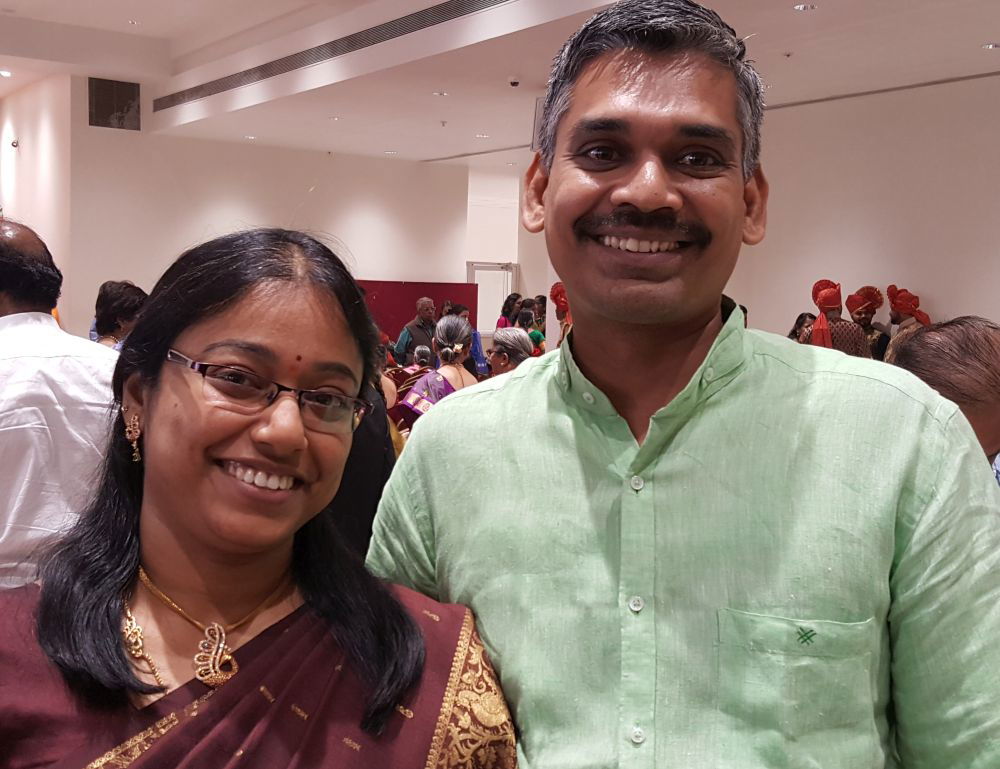
SS: You are the coach of the girls’ team here at the World Juniors in Gebze, Turkey. A few days ago, your husband, Ramesh, was the coach at the Asian Nations Cup and now is about to go to Batumi. So, how many days are you guys outside the house, travelling?
AR: I don’t travel much, Ramesh is the one who travels a lot. I just do one tournament a year for the Indian players. This time, it is the World Juniors.
SS: You have been to many events. Can you tell us about the atmosphere here in Turkey in comparison to the other events you have attended?
AR: I think this tournament is very well organized, except for the fact that the hotel is a bit far from the playing venue. But they have also arranged for transport from the hotel to the playing venue, so I think it’s good.

SS: Aarthie, we should ask you a bit about yourself and we have to go back in time. Can you tell us how your chess career began? We know from various sources that you were extremely talented when you were young.
AR: I just began by playing school tournaments. When they announced that there was a tournament at my school, I just enrolled. I didn’t know how to play so I began learning after I came home from school that day. The tournament was in two days after this and I stood second in it.
SS: And who taught you?
AR: My brother taught me the initial moves and I managed to finish second. Luckily this was a knock-out tournament and all the seasoned players got eliminated in the previous rounds. I was probably playing against weaker opposition and winning. In the final round, I lost to a seeded player and finished second. This was a big boost. So, I basically came into chess by winning a tournament. And then, I was so excited to win a prize that I wanted to play more.
SS: So the thrill was related to winning.
AR: Yes
SS: Many people say they were enchanted by the beauty of the pieces or something like that, but for you, it was more about the competition.
AR: Competition as well as coming first. I always wanted to be the best at whatever I do. That’s my philosophy in life and that is what took me a long way in chess.
SS: You said your brother taught you how to play. Is he also in chess?
AR: No he used to play with his friends mostly. After I started, he also began to take it up but then he was already 15 at this point. So, then he had to focus on his education and all and he had to give up chess. I think his best performance was a second place finish at the district level tournament.
SS: And how did it go further? Who was your next trainer?
AR: I had three or four trainers throughout my career. When I started, I had a few trainers who came and went but it didn’t set well. And then I started training with Mr. Shreedharan. He is the brother of IM R. Balasubramaniam. He was my first long-term coach and we worked for around three years. I had already begun coming up strong at the state and national levels by this point. I had finished fourth thrice in under-10 and other such tournaments.
After three years, I began working with Mr. Murali Mohan. Most people from the chess field would know him. I trained with him for another three years.

At that time, I got my first breakthrough. I won the National Under-12 and went on to play the World Under-12. And then I was coming up strong in sub-juniors as well.
SS: Which year would this be, the World Under-12?
AR: I had won the National Under 12 in 1993, so this must have been in 1994.
SS: So, during this time, I think, chess was already booming. With the advent of Anand in world chess and everything…
AR: Yes, Anand was at the top but still, I think, it was not as competitive as it is today. Today it is just unimaginable.
SS: You are at the heart of it so we will come to it later. So you were one of the biggest talents in the country in ’94 and you were training under Mr Murali Mohan…
AR: Yes, and I also happen to be the youngest at the time to qualify from National B to National A. I was 12 at the time and I think it was Harika who broke this record.
SS: So, who were your competitors back then?
AR: In my age group, I think it was only Meenakshi. And we had some seniors like Swati Ghate, Nisha Mohota, Vijayalakshmi, Pallavi Shah. They were all a little senior to me but since we all used to play all the national championships – Under-16, Under-18, Under-19… whatever came up, we would play it.
SS: Always to win, yeah?
AR: Yeah. I think that is a good way to take life. You can do whatever you want. That’s the philosophy my father gave me. He said ‘you can be a cobbler if you want, but be the best cobbler in the world’.
SS: And after Murali Mohan, who was your next coach?
AR: I trained with Murali Mohan sir until I think until ’96. Then I started training with Mr Ramachandran for a short while – maybe about one or two years, up to ’98. In 1995, I won in both the Under 14 and Under 16 Nationals and got to play at the world level. By this time, I was already a regular at the National championships. In fact, I got my initial rating – of 2040 – at the 1994 National A Championship. At that time, you had to compete at the Women’s National A to get a rating. And then my rating remained like that for a couple of years because I could not play any rated tournament at that time.
So, then, the next breakthrough came in ’98. In ’97, I had started working with Ramesh. My main breakthrough came in ’98…
SS: But before you continue, we have come to know from many sources and even Ramesh has quoted many times that he had lost to you before becoming your trainer. We would like to hear your side of the story.
AR: This was way back in 1990 when I had just started playing chess. That was the first time I had met Ramesh and I was paired against him. He was already the national sub-junior champion or something at the time and he lost to me. After this, he was so upset that he withdrew from the tournament. [laughs]
Subsequently, we played one more time within a year. And this time he took his revenge. He beat me very badly, making four queens.
And then, we had gone to Iran or somewhere, where he was the coach of the Indian team. By this point, my mother wanted a change of coach for me. So, we just approached him and he began coaching me from 1997. I think that was when I began real professional chess. These days, I feel Ramesh has mellowed down. In his younger days, he was much more strict as a coach.
SS: How was he more strict?
AR: Basically, his philosophy at the time was very different in comparison to other coaches. He would always say that the result was in your hands, no matter what circumstances you are in. Having a headache, according to him, was not an excuse for playing bad chess. Even if you are going to die the next moment, he felt, a chess player should make his or her move correctly. That was his approach towards the game and that sank in very well in me. Because of him, I never gave excuses or reasons for losing and this took me places.
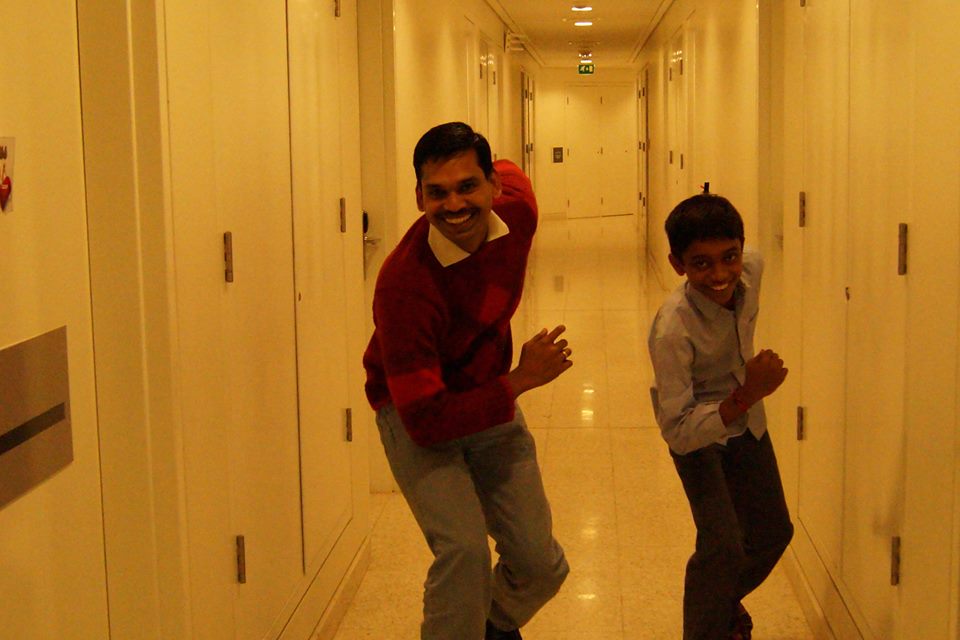
SS: You already had this winning instinct or the desire to do better in you. So, would it be right to say that this was further strengthened by your training sessions with Ramesh? And if I am not mistaken, weren’t you one of the strongest players in the world in your age category around this time?
AR: Yes, I think, in January ’97, I had won the Asian Sub-junior Championship in Mumbai with a 100% score – 9.0/9. I think it still remains a record. And then in ’98, I went on to win in the Under-18 category. In this tournament, I played all the good players of the country, including Swati Ghate, Nisha Mohota, Pallavi Shah. There was just everybody in that tournament and I won that tournament. And then I won this event again next year in 1999.
After winning it in ’98 – I mean the National Under-18 – I really wanted to win the World Under-18 as well. I really wanted to do something at that point. I had prepared hard for the event and my rating also jumped in this tournament. If I am not wrong, they used to publish only one rating list every six months and a player could not gain more than 100 points. I had gained 200 points in these six months but I could gain only 100. The remaining 100 points were added in the next rating list. So, in a year, I had increased 200 points. That was the maximum we could, at the time. So, suddenly I had jumped from Elo 2040 to 2240 or so. And I think I was among the top women players in the world at that point.
And then, I had really worked hard for the World Under-18 Championship, in ’98. I think I was seeded around 57th or so, I can’t remember.
SS: And where was it held?
AR: This was held in Oropesa, Spain. I was probably seeded 30th – I really cannot remember – but I had finished 13th. I was not very happy about this. It was Diwali when we landed in India and I decided that I would win the next World Championship at any cost.
At that time, Murali Mohan uncle was very helpful. He gave me some articles on how Olympic champions practised. I think there was an article in the ‘Reader’s Digest’ that year. I used to read all these things. They used to do this visualization technique wherein they imagined themselves winning the tournaments they were to participate in, etc. So, I did everything possible for a year. I don’t think I could have that kind of determination now, when I think about it in retrospect.
SS: What was it that motivated you to work so hard for a year?
AR: I think it was because of my family who supported me throughout. And it was also Ramesh’s support. At that time, nobody had a proper coach. Ramesh was already an IM at the time and was very strong in openings. Because of this, even I was very strong in openings. Compared to all the other women players in the country, I had a very big advantage.
I think it all just happened. It was a combination of many factors. It all just happened at that time. For a year, I was completely focused on winning this Under-18 World Championship. I didn’t know what it meant at that time but I felt I should win it. Then I did everything: opening preparation, physical fitness, psychological preparation… I had even started eating bland food a month before the tournament because that is what you get in Spain.
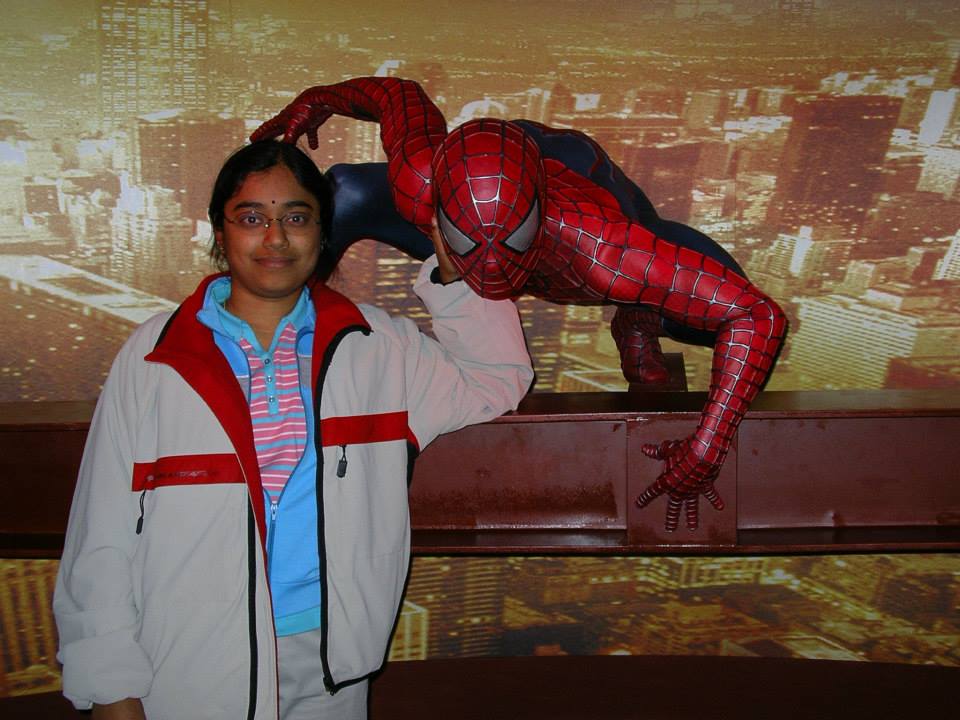
SS: Did you also try to shift your schedule to the European time zone?
AR: Yes, one week before the tournament, I began to practice as per the European time zone. The rounds used to be in the evening so we had to work through the night. I also knew the venue because it was the same venue as last year. In the tournament, I was OK till the seventh round when I went into the lead. I thought I would win the tournament comfortably but, in the penultimate round, I lost a very bad game to one of my compatriots.
Before the game, I had told Harikrishna and Venkatesh that I was going to play a certain variation. Both of them had told me that it is not very good but I thought I would manage over the board. It didn’t work out well.
The final round was important because, in those days, the only tie-break they used was Progressive. Since I was leading throughout, I think, I had a better chance. But to win just after having lost a game is difficult.
After losing in the penultimate round, I was caught in the lead by another player. In the final round, her game finished in just one hour and she had won. I wasn’t aware of this at the time. I was fully concentrated on my game. I played a very long game with a Chinese player and finally I managed to win. Still, the feeling of having won the World Under-18 hadn’t sunk into me until I reached Chennai. It was a big turn in my career.
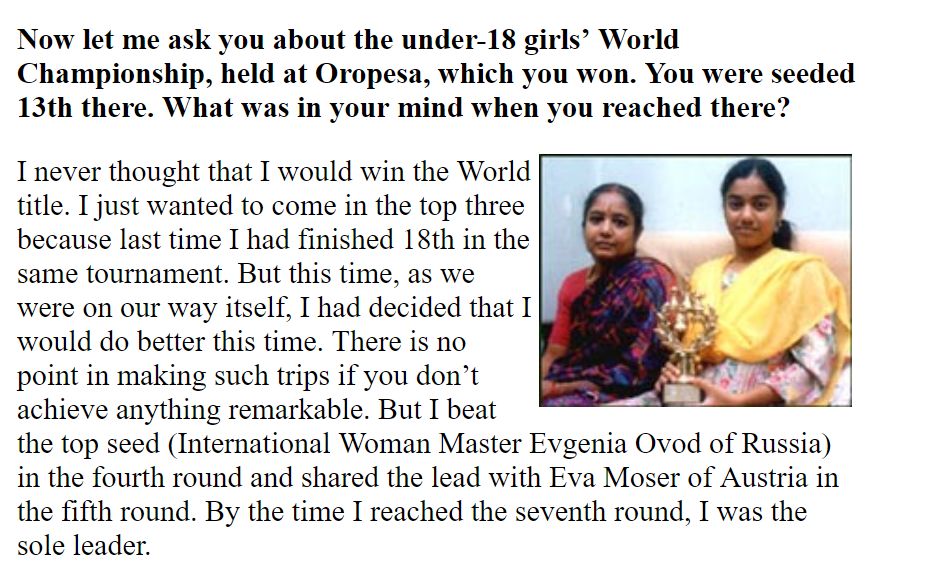
SS: It was the culmination of one year’s hard work.
AR: Yeah. Then, things changed for me. I got a very good sponsorship at the time from Wipro.
This also happened all of a sudden. I had given an interview to NDTV after the World Under-18 and had said that I need a sponsorship. Almost immediately after this, Wipro contacted me and gave me a sponsorship right away. That was a very good sponsorship. I got it for a period of three years during which I was able to complete my WGM title requirements.
SS: So you became a WGM at the age of around 21. Did you aim to become the world champion at any point?
AR: I played the World Championship twice during the time when FIDE organized these knock-out championships. I was never able to pass the first round. In both attempts, I lost in the first round itself. In the Asian Championships, my best was a sixth-place finish. This was when there was only one an all-inclusive Asian Championship in which everybody including China. Basically, I didn’t plan much ahead of that.
I got married in 2003, just after completing my WGM title. That was the time I started realizing that Ramesh had missed out on a lot while supporting me in achieving something good. So, then I had to back him in his career as well.
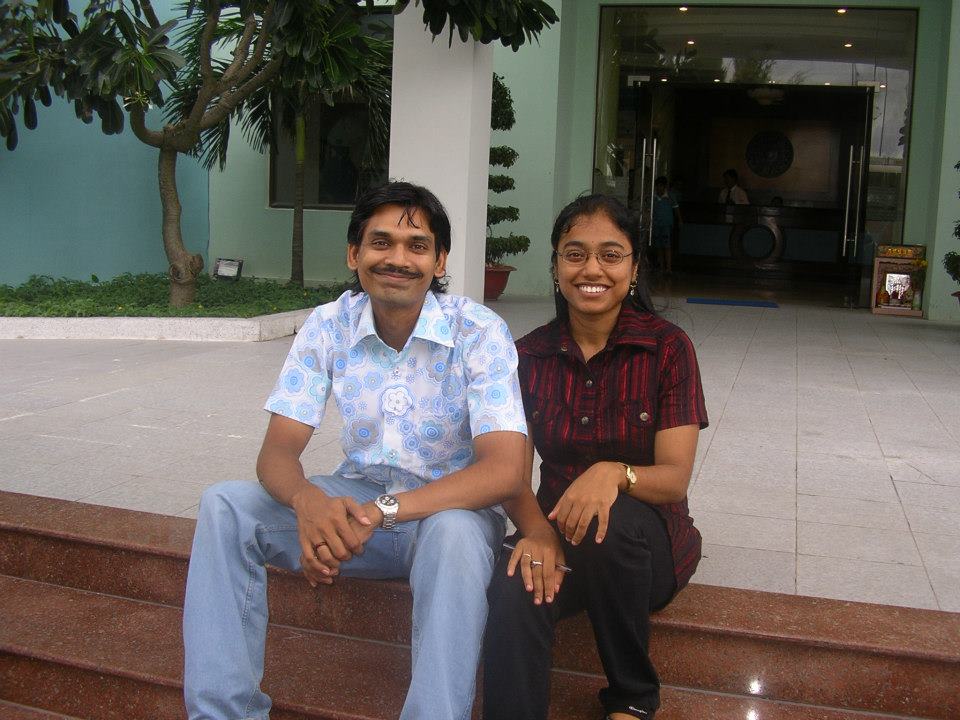
SS: So the roles changed!
AR: Yes, absolutely. And another thing – I think Ramesh would agree with me on this – is that being a student and being a wife are two completely different things. I can be an obedient student but I can’t be an obedient wife.
SS: Yes because then there are more things apart from just chess…
AR: Yes, that was also one of the reasons I eventually quit chess. So, then, after winning my WGM title, I also went on to win the National Premier Championship, later in 2003.
SS: This was the time when Viji and everyone were playing, right?
AR: Yes, the 2003 Nationals was one of the strongest National Championships we have ever had. There was Viji, Tania, Harika… everybody except Humpy was playing. I won the championship but it was a very tough finish. I had to play Meenakshi in the last round. A loss would have made Viji the champion. So Meenakshi was under a lot of pressure as well. I managed to hold her to a draw and then I won the title. With that, on a high note, I decided to take the backseat and let Ramesh play.
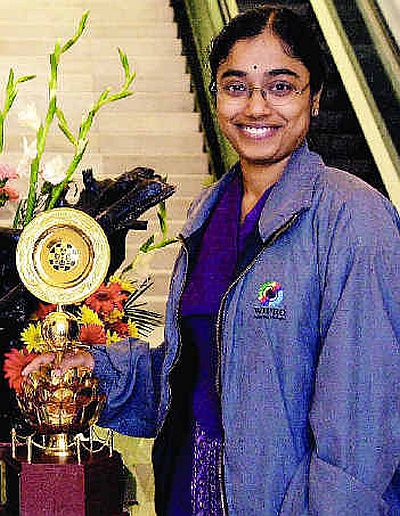
SS: That must have been a tough decision.
AR: Yes, but life is all about decisions. And, I think, this was a good decision. I don’t have any hard feelings about this decision either. But I do feel that I have not reached my peak in chess. I had two IM norms at the time but I did not, somehow, pursue it.
SS: And I think your rating was above 2300 as well?
AR: Yes, my rating was 2358 when I decided to quit.
SS: Any aims of getting the last norm and trying for the IM title?
AR: I think, the norms are no longer valid. The norms had to be validated and I was not in chess for a long time so I missed validating them. But, I think, I can still make three more norms. It’s not a tough thing now at all.
I think, I will come back to play but, probably, after my children are settled. Right now, I have kids at home and their future is in my hands.

Transcription by Aditya Pai
Related links:
Check this interview with Aarthie in 2000 on Rediff by Shobha Warrier


